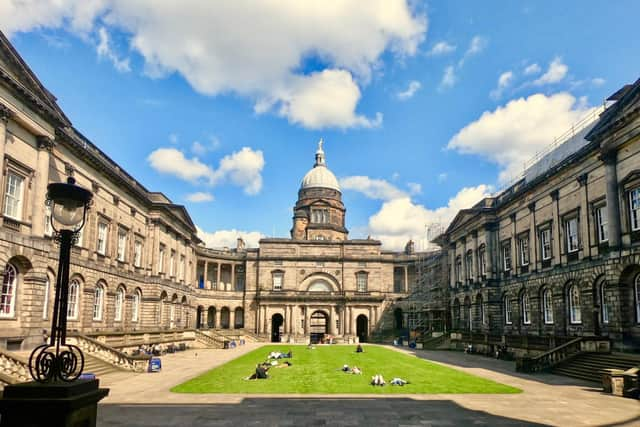Edinburgh University Zoom meeting: what happened as black and LGBT students attacked during video call - and Zoom’s response
Black and LGBT students at the University of Edinburgh have been attacked during a virtual meeting.
The Zoom event, hosted on Sunday 14 February, was “hijacked” by people shouting racist and homophobic slurs.
One of the event’s guest speakers was reduced to tears.


Advertisement
Hide AdAdvertisement
Hide AdThe purpose of the virtual event was to celebrate black and LGBT culture.
So, what happened during the Zoom meeting?
Here is everything you need to know.
What happened during the Zoom meeting?
Around 50 people were given a Zoom link to join the meeting, hosted by the university’s African and Caribbean Society alongside Edinburgh Global.
The virtual event, named “Pro Black and Anti-Gay?”, was organised to coincide with Caribbean Week which ran from 7 to 14 February.
It focused on “a conversation about the intersectionality of oppression” and how communities could “move forward, learn to be accepting of each other and love ourselves”.
The link to the Zoom room was not password protected, according to BBC News.
At the end of the event, the “hijackers” joined shouting racist slurs, homophobic slogans and displaying “horrific” pornography featuring black individuals.
Racist and homophobic slurs were also posted to everyone in the meeting through Zoom’s chat function.
Lucien, one of the event’s student hosts, told BBC News: “We had pretty much completed the event.
Advertisement
Hide AdAdvertisement
Hide Ad"And when we said we would start taking questions from the floor, that's when it all started."
An audience member, who has remained anonymous, described feeling “helpless” as several people appeared shouting, “white power”.
She told the BBC that the attackers continued to rejoin the meeting multiple times even after they had been kicked out of the virtual room, using the link that had been shared with students.
Caribbean LGBT rights campaigner Jason Jones said he had "never experienced such a horrible attack" throughout 30 years of campaigning.
He added that technology companies had a duty to “protect their users”.
Jones said to the BBC: "They control these platforms, so they need to have a zero tolerance for this kind of discrimination.
"Over the last year of the pandemic, I've attended Zoom weddings, Zoom funerals, and business meetings.
"This was a virtual hate crime. It was so out of the blue that there was no way of preparing for it.
Advertisement
Hide AdAdvertisement
Hide Ad"This attack was designed to get under my skin and create fear and intimidation. I have had a very dark and awful emotional response to it.
"It reduced me to tears."
How did the hosts respond?
Following the event, the African and Caribbean Society posted a statement to Instagram.
It called the attack a “horrible occurrence that should never be repeated”.
“This event was interrupted by bigots using abhorrent homophobic and racist slurs and threats.
“We strongly condemn their actions and this attack only proved the necessity of these discussions.
“We maintain a zero-tolerance on any form of discrimination,” the statement said.
The society added that the crime would be “reported to higher authorities” and that action would be taken.
The university told BBC News it regarded "any incident of discrimination as a serious matter".
What has Zoom said?
Advertisement
Hide AdAdvertisement
Hide AdZoom responded to the incident by saying it was “deeply upset” and an investigation had begun.
The US-based company said its Trust and Safety team were looking into the attack.
It said: "We take meeting disruptions extremely seriously.
"And where appropriate, we work closely with law-enforcement authorities."
Patrik Hermansson, of anti-racism group Hope Not Hate, told the BBC that they had seen a "rise" Zoom event attacks.
He said: "We see invite links to meetings being shared by far-right accounts on social media and in chat rooms.
"And people are urged to join and disrupt or spread hate."
What is Zoom?
Zoom is a video conferencing platform which has become immensely popular during the pandemic thanks to the rise of working from home.
Many businesses rely on its functions to host meetings and catch ups between colleagues and clients.
It is also a popular mode of communication between families and friends who have not been able to see each other during Covid-19.
Advertisement
Hide AdAdvertisement
Hide AdZoom, which is free to use, is renowned for its ease of use and high quality video and audio.
Up to 100 participants can join meetings, while up to 1,000 can attend using the Premium version.
Attendees can join a Zoom meeting without even signing into the app, but those hosting a meeting need to register for an account.